
Satsvarupa dasa Goswami Maharaja
Spiritual Family CelebrationSaturday, July 5, 2025
What
Meeting of Disciples and friends of SDG
Where
The Veterans of Foreign Wars Hall
845 Hudson Avenue
Stuyvesant Falls, New York 12173There is plenty of parking near the Hall. The facility is just a few minutes’ walk from SDG’s home at 909 Albany Ave.
Schedule
10:00 – 10:30 A.M. Kirtana
10:30 – 11:15 A.M. Presentation by Satsvarupa Maharaja
11:15 – 12:30 P.M. Book Table
12:30 – 1:15 P.M. Arati and kirtana
1:15 — 2:15 P.M. Prasadam FeastContact
Baladeva Vidyabhusana at [email protected] or (518) 754-1108
Krsna dasi at [email protected] or (518) 822-7636SDG: “I request as many devotees as possible to attend so we can feel the family spirit strongly. I become very satisfied when we are all gathered together.”
******
Śrī Caitanya-caritāmṛta, Madhya-līlā 20.124–125: “O great learned devotee, although there are many faults in this material world, there is one good opportunity—the association with devotees. Such association brings about great happiness. . . . .”
Srila Prabhupāda: “Therefore, our Society is association. If we keep good association, then we don’t touch the darkness. What is the association? There is a song, sat-saṅga chāḍi’ kainu asate vilāsa, te-kāraṇe lāgila mora karma-bandha-phāṅsa (Gaurā Pahū, verse 3). Sat-saṅga. Sat-saṅga means association with the devotees. So the one poet, Vaiṣṇava poet, is regretting that, ‘I did not keep association with the devotees, and I wanted to enjoy life with the nondevotees. Therefore I’m being entangled in the fruitive activities.’ Karma bandha phāṅsa. Entanglement.” [Conversation with David Wynne, July 9, 1973, London]
It was another bad week for headaches, (avg 3 per day ). At the same time it was another good week for writing, (average 10 pages per day). So Satsvarup Maharaj is taking the “safe” philosophical path and pushing on despite the pain.
Hare Krsna,
Baladeva
If you would like to help, please contact Kṛṣṇa-bhajana dāsa at [email protected] or [email protected] and we will find you a service that utilizes your talents.
Krsna says: “I am not in the Himalayas where yogis meditate or in Vaikuntha. But, my dear Narada, I am there wherever My devotees chant My Names.”
Srila Prabhupada says that the desire to render devotional service is a test whether one is chanting properly. Service should be the result of intense harer nama. By repeating the Hare Krsna mantra we are actually praying, “Dear energy of the Lord, Radha, dear Krsna, please give me Your service.” Therefore, we shouldn’t avoid service. Srila Prabhupada writes, “If one is purified by following Sri Caitanya Mahaprabhu’s orders—that is, by chanting the holy name of Krsna—one must certainly be eager to render service to the Lord. This is the test. When one engages enthusiastically in the Lord’s service, it is to be understood that he is reaping the results of chanting the names of Krsna and Hari.” (C.c. Madhya 16.188-89)
******
“My dear mind, if you are eager to reside in Vraja-dhama and execute devotional service on the platform of ragatmika-bhakti, as well as to yearn for direct service to Sri-Sri Radha and Krsna, then simply desire to remember and worship birth after birth the lotus feet of Sri Svarupa Damodara, Srila Rupa Gosvami, Sri,Sanatana Gosvami and all the other associates of Sri Caitanya who are the recipients of His mercy.” (Manah-siksa, Verse 3, p. 11)
In this verse of Manah-siksa, the author expects his mind to be eager for desiring raganuga-bhakti. Bhaktivinoda Thakura has said that these are lessons for all Gaudiya Vaisnavas. In his Sri Bhajana-darpana commentary to Verse Three, Bhaktivinoda Thakura states that the path of raganuga-bhakti is traversed by practicing vaidhi-bhakti, especially chanting and hearing under the direction of the spiritual master. At no stage does one jump over the basic activities of chanting and hearing in order to become more advanced. But with the advanced or spontaneous stage, the chanting and hearing change from duty to love.
******
Bhaktivinoda Thakura quotes from Rupa Gosvami’s Bhakti-rasamrta-sindhu:
“In order to become eligible for raganuga-bhakti, one must develop intense greed (lobha) to follow in the footsteps of an eternal associate of the Supreme Lord who is a permanent resident of Vraja dhama, and who is one hundred percent steeped in the mood of ragatmika-bhakti.” (p. 12)
Bhaktivinode Thakura states that this verse refers to madhurya-rasa in Vraja dhama, which is “the very essence of all spiritual mellows, and if this spiritual current is at all present in other spiritual stages, it is there only in restricted degrees.” It is also very rare that one can expect to attain to devotional service. It can be achieved quickly if one receives the mercy of rasika Vaisnavas.
******
[O mind], you are always distracting me with useless thoughts. Why won’t you pay attention to the Hare Krsna mantra? Why won’t you allow yourself to be captured by the chanting tongue and the hearing ear? Should I be blaming you for all the offenses I commit against the holy name? (It gets quite complicated and I’m not a sankhya-yoga expert to delineate the relationship of the false ego with the mode of passion and where the mind fits into that, how it all works.)
Anyway, rather than blame you, I plead with you to please hear the Hare Krsna mantra. It will be good for both of us. I am going to try to give up these aparadhas, but in one sense, you are the only hope, dear mind.
******
Dear mind, I say you are the only hope, but I know that the greatest hope is from the Vaisnavas who bathe us in Krsna consciousness and free our minds and senses from material meditation. Still, in terms of the group of sub-persons who equal this one jiva with all his functions, our hope is that you, dear mind, will be humble and try your best. That’s all I’m asking. I know by nature you are fickle—that’s a scriptural statement. You are cancala. You are difficult to control. I can only beg you. Part of begging for the nectar of the holy name is to beg my own mind to please cooperate.
pp. 127-30
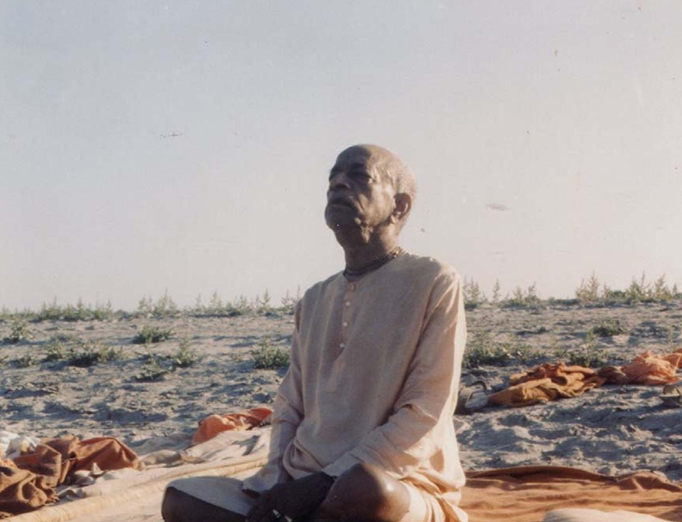
In this picture Prabhupada is solemnly saying his Gayatri mantras while sitting on the bank of the Yamuna in Vrndavana. Some devotees say that when you say your Gayatri you should cover your hand with your cloth. The rumor is that if the demigods see you chanting Gayatri they will get jealous and do you harm. In this picture Prabhupada is not covering his hand with his cloth. Jayadvaita Swami has pointed out that there are several photos of Prabhupada saying his Gayatri with his hand uncovered. J. S. concludes that the demigods’ jealousy is just a rumor or myth, and that we don’t have to cover our hand doing Gayatri.
Saffron clothes are seen scattered around on the ground. Prabhupada’s disciples are stripped down to their kaupinas and are standing in the Yamuna saying their Gayatris and playing in the water. Sometimes Prabhupada would say that he would not go in the water for Gayatri but just touch it to his head. But then he gradually began to take his clothes off and join his men in the water wearing just a gamsha. It was a great thrill and pastime to play in the Yamuna with Srila Prabhupada. Devotees would gently splash water on Prabhupada’s body and massage his limbs. He would hold his fingers over his nostrils and take a full dip under the water. How kind he was to associate and play with us in such a familiar way.
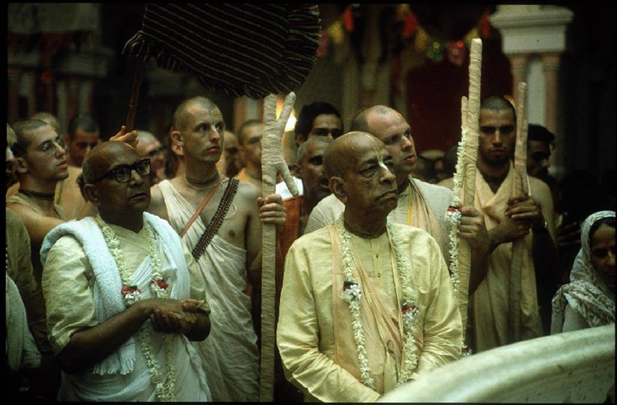
Prabhupada would always look very gravely at the Deities in the Krishna-Balarama Mandir. The surrounding devotees reflected Prabhupada’s mood. The Deities— whether They be Gaura-Nitai, Krishna-Balarama or Radha-Syamasundara—all project light, smiling moods, so why does Prabhupada look so heavy? It is a look of ecstatic devotion. We read of the symptoms of physical ecstasy as exhibited by Lord Caitanya or any devotee on the advanced platform and they are varied: laughing, crying, morose (in separation), stunned, feelings of unworthiness, hair standing on end, etc. It is not that Prabhupada has to reflect the light mood of the Deities’ faces in order to be in proper tune of reciprocation. His devotion is like an ocean with various waves. And his demeanor controls that of his disciples. They take their cue from Prabhupada and only want to follow him.
I don’t think he is displeased with the decoration of the Deities, because he always supervised the pujaris and made them keep a high standard. The Deities were beautifully dressed and garlanded with many fresh flowers. Prabhupada is feeling transcendental emotion; he is not looking at a statue and feeling empty. Once a devotee looked at Prabhupada’s passport photo and said, “You look very sad in this picture.” In the photo Prabhupada wore no kurta but only his sannyasa top and dhoti and neat tilaka on his arms and forehead. But the corners of his mouth were turned down. He replied to the disciple, “That was a moment of ecstasy.” Many pictures of Caitanya Mahaprabhu in the gambhira show Him with a sad-like expression. Gambhira means grave or deep. Prabhupada here is gambhira, or deep, and his emotion is very wonderful.
pp. 24-26
Karuna dasi asked me, “Is it true that it doesn’t make any difference whether you chant out loud or in the mind?” She quoted from the section in Journal & Poems where I was very ill, and I said I had to chant silent rounds. Also, a senior devotee, when answering questions at a festival, said that it didn’t matter whether one chanted out loud or in the mind. Karuna asked, “Then why do we chant out loud? Is it because it’s easier and quicker to control the mind?”
Prabhupada emphasized chanting aloud. In this age, to think of Krsna in the mind—which is what silent chanting is—is very difficult. The mind is full of noise. The silently remembered mantra can easily be overcome. It’s too easy to put Krsna on the back burner while we follow a passive or far away line of thought. It’s even easier to turn the chanting motor off completely. The sound vibration of the mantra breaks through other thoughts and wakes us up.
But that doesn’t mean that inattentive chanting is allowed. In the absolute sense, silent chanting and out loud chanting are both chanting. In Sanatana Gosvami’s Brhat-Bhagavatamrta, Gopa-kumara visits different persons in the higher planets and he hears different versions on this point. Some of the jnanis tell him it’s better to think of Krsna in the mind, but Sanatana Gosvami’s conclusion is that it is better to chant out loud.
One of the benefits of out loud chanting is that it helps other living entities because they hear our chanting. Also, Prabhupada says that out loud chanting engages two senses, the tongue and the ears. When these two senses are focused on the object of Krsna’s name, then our yoga is complete.
Dinanatha dasa asked me about the trnad api verse, the foundation of our chanting. “One should think oneself lower than the straw in the street, be more tolerant than a tree, and always prepared to give all respects to others.” He asked, “While meeting nondevotees at my job, it’s difficult to offer respect when it doesn’t seem due. Should we adopt this attitude of humility no matter how we are treated?”
Hmmm. There is a different kind of respect offered to a devotee than to a nondevotee. Even among devotees we offer respect according to their level of advancement. Prabhupada says that when a nondevotee gives us advice or his opinion, we respond with politeness: “Yes sir, what you say, that is all right.” We can’t take him seriously, especially when his views conflict with Krsna consciousness. If he doesn’t want to hear about Krsna consciousness from us, we show respect by according him his God-given space. We don’t commit violence upon him or disturb him, and if he criticizes us, we tolerate it. Why should it be so difficult to offer everyone respect? Everyone is part and parcel of God and should be respected accordingly.
In regard to chanting, we will be less disturbed in mind if we don’t try to get respect from others. Neither should we allow non-devotees to disturb us. In that sense, we can say a devotee offers a nondevotee respect as a tactic—by offering respect to others, the devotee will be left alone to chant. Give people their due and be done with it. We are not in competition with the nondevotees.
Respect offered to devotees is outlined in The Nectar of Instruction. We offer respect in our minds to those who are favorable to Krsna consciousness and who occasionally chant the holy names, even if they don’t follow the rules and regulations of sadhana-bhakti. We offer sincere obeisances to those who follow the rules and regulations. We serve the first-class devotees and try to hear from them about Krsna.
A crow landing on a fence post and taking off again looked like a human being in front of the schoolhouse. Then further down, the six-foot-high milkweed looked like another person to me. I wanted to be alone and to rejoice in the morning feast—the early light before the blazing sun, the sloping green valley ending in pines, the vantage where we can see one valley after another, and hills in the distance, and sky, and clouds. The half moon looked like it had frayed edges. It was lingering even at 6:00 A.M. The mourning doves were imploring. I was out for an hour and hardly noticed the surroundings until the end, partly because it was dark, but mostly because I was chanting and paying attention to the sound. Then I paused and saw the thorny raspberry bushes, the milkweed, the violets, and the button flowers. Keep chanting.
pp. 40-43
We all wanted to see Prabhupada when he came to a nearby city like New York or Boston, but we knew that the most important way to advance in Prabhupada’s service was by carrying out his orders. That often meant sticking to one’s particular location. For example, after Prabhupada visited Boston in May 1968, he went on to Montreal. I wanted to go to Montreal with him, but it was more important to stay in Boston, both because of my work at the welfare office and my duties in the temple. I knew I could realize Prabhupada by service, and not by whimsically traveling where he was. If I had gone to Montreal over that summer to visit Prabhupada, I would now be able to tell firsthand some of those Montreal pastimes. I stayed back, however, hoping that by sticking to my place, I would make spiritual progress in separation. It is still true that we serve Prabhupada in separation by carrying out his orders.
If you could be in the same place with Prabhu-pada, then your reward was to see his actual lila. On the other hand, if you served him anywhere in the world, you had the advantage of actually attracting the pure devotee. By that attraction he would come to you. Prabhupada said that we should not try to see Krsna, but act in such a way that Krsna sees us. He gave the example of an office worker in a big company who does his job very nicely. One day the president of the company examines his file and is impressed at the man’s work. Then the president comes to that man’s desk and congratulates him. We attract Prabhupada by carrying out his orders.
Let us make our hearts pure and enthusiastic to receive him. Then when he comes to see us, we will have something to say to him. His coming will not occur just by hanging out as a guest, with no particular service, in the temple where Prabhupada is visiting.
Sometimes the happy combination occurred when we could please Prabhupada by rendering him service while in his personal presence. This happened the day that I was walking to work up Second Avenue in New York. I met Swamiji walking south toward the storefront. In those days, he didn’t usually take morning walks, but he had started this habit after his stroke.
I saw him coming around the corner and walking my way. It was a great relief to see him because I was feeling anxious. I was anticipating the difficulty of going to work that day. The caseworkers were on strike, and in order to enter the building, I would have to go through their picket line. I had not joined their strike because I was working for Swamiji. I was not interested in losing weeks of pay in the name of trying to get a higher salary. I knew they would all hoot and holler and threaten to hit me when I walked through their double file.
Swamiji knew about the welfare strike, and he had already passed the picket lines from the other side of the street that morning. The workers had yelled at him because they knew he was sending me to work.
Swamiji was accompanied by Kirtanananda, and, just before I reached them, I bowed down to Prabhupada, touching my forehead on the side-walk. As I rose, I saw Swamiji smiling very beautifully. He reached out and touched me slightly. We exchanged only a few words at that time, and I went off to my task filled with his blessings. That was certainly a moment to treasure: service in Prabhupada’s shelter, approved by him.
While going about your daily activities, try remembering that what you are doing is service to Prabhupada. Imagine that Prabhupada is suddenly “coming around the corner” and offer him your obeisances. What would he say to you? What would you say to him? How would you feel after he continued his walk?
pp. 32-37
Dear Prabhupada,
Please accept my humble obeisances. I must approach you by being friendly with your disciples. I saw one of your disciples in the Samadhi Mandir. He had been away from ISKCON and has now come back. I took the risk of saying hello to him, and sure enough he asked to meet with me. I’ll have to do it. But that’s part of my desire to deepen my worship of you. “Encourage them more and more.” I won’t think that I am meant to be in full-time private bhajana and that I have no time to meet with Godbrothers.
Still, these times alone with you are special. I will probably leave Vrndavana in November after the meetings and lectures and try to spend a little time on my own to read your books.
What will help me increase my consciousness of you? I touch your feet again and again. I see you wherever we turn in Krishna-Balaram Mandir. I try to help a brother remember you and serve you. I try to be genuine. I don’t want to be a professional “Prabhupada man.” I can praise you if I have real feelings for this service.
I want to get rid of any cartooned, stereotyped, or simplistic versions of Prabhupada. I will also leave others to find their own genuineness, even if they do that in ways different than I do it. We all want you to endorse our projects. We build your museum, your restaurant, teach your children, worship your seat, collect money for you —and serve in your movement, which you said was your body. We all want to follow you sincerely.
Now I am visiting your rooms. You liked it here. Your secretaries and cooks and disciples were always hoping to catch a glimpse of you (and maybe a word with you) when you lived here. “Srila Prabhupada, what should I do?”
Preach in America at the colleges and distribute books. Help maintain the temples. As a sannyasi, travel and preach. Write to help devotees maintain their Krsna consciousness.
I can write better books if you will empower me. Also, Srila Prabhupada, I want to be friendly to your devotees and when I do so, to deliberately think of you.
It’s obvious, Prabhupada, that you wanted preaching. A grhastha may say he has other duties or is not fit for preaching, but a sannyasi cannot make excuses.
“Preach! Preach! Preach!”
I do it, and “according to my capacity” means I also have to deal with my headache syndrome. You overcame so many headaches and heart attacks and were undaunted, even at seventy.
But I am not a paramahamsa like you.
Become one?
(Not so many pilgrims today. Purusottama-masa is over. Now it’s just the regulars….. Devotees come to you with their petitions. I see the temple president of ISKCON Tucson standing before you making pranamas. And now poor pious Indian people. One asks, “Who is he?”
“Prabhupada,” replies the young caretaker who carries a pole for chasing pigeons.
“Huh?”
“Prabhupada.”)
Golden Prabhupada, they don’t know you and they don’t know Sri Caitanya Mahaprabhu. They barely know Krsna. In the West they don’t know anything. There is a great need to preach.
Srila Prabhupada, I read in your Caitanya-caritamrta purport that when Sanatana Gosvami flattered the jailkeeper, calling him learned, the Muslim jailkeeper accepted it as a fact. You wrote that it is natural when one is praised to accept it. I accepted praise from 1978 into the 1980s when they said I was one of the only pure devotees. Do I still accept such praise, such as when they tell me I’m humble, a genius, an artist, a pure devotee?
I’m just a small person. I have no special qualities. I like to practice writing. I want to be with you. Even the good things I do are motivated and impure. But you accept me.
The writing flows when I sit before you. I’m not yet close to you, but I want to be. I’m taking advantage of the larger-than-life-darsana you offer in your samadhi.
“I do not find the strength to carry on alone the sankirtana of the holy name of Hari. Please bless me by giving me just one drop of faith with which to obtain the great treasure of the holy name of Krsna.” (“Ohe! Vaisnava Thakura“)
I ask you for strength. That prayer suits me. No pretense. Please give me the shade of your lotus feet. Give me good qualities. Give me the strength to chant the holy name.
Or should I not say that? At least I’m exposing it here, Srila Prabhupada. You can correct me.
pp. 24-31
I was worried
that when I give my talk on Prabhupada
they might not laugh at the funny parts,
something will get lost in the translation
and I’ll be left pulling a huge horse cart
all alone and I won’t even know
I need their help.
But I’m ready if it happens.
I’ll keep diving into the memories.
I gave Prabhupada a mango every day
because he spoke of them.
He said, “This is love, this is Krsna consciousness.”
I said to him I am feeling hopeful
and this Krsna consciousness seems very strong.
I said I have to go for the weekend to my parents
home, but not without telling you
because you are my guru and you ought to
approve of my movements or at least know
why I am missing from your sight
for a few days.
Yes, he smiled, that is all right.
And he let me go and come back.
If they don’t laugh, that’s all right.
Maybe it’s not even funny.
Just tell it, what you said and what the Swami said.
I said the buildings don’t frighten me anymore.
Swamiji, I saw a man drunk or maybe crazy in the
street
he was directing traffic. That same man
had attended the temple kirtana the night before.
“Oh, he was a madman?” Swamiji said.
He lived in New York
above the noises, anger,
a lotus floating on the water,
plain transcendental goodness he wanted from us—
respect the holy name, no meat or intoxication,
no illicit sex. Just chant with us.
Maybe the devotees here know all this
from Prabhupada-lilamrta.
But I’ll tell it again.
Under the tree at 6 P.M., they can laugh
or listen or look off and
think of their own work.
I will tell and be satisfied.
I will desire that someone
become a pure devotee of my spiritual master.
Prabhupada, I am confident
that you will never leave me. I am also
confident that I will never leave you.
Also, I think no matter where
I start a poem on any morning
it can be genuine meditation on you.
You are going for a morning walk
and I will join you.
Today I returned to the temple after 30 hours
of headache. They accepted me back without a word.
I don’t speak Czech so what is there to say?
I wasn’t up to singing samsara but drifted in it
while another sang. I drifted in memories and feelings,
standing in place, swaying with the rest
to the soft beats of kirtana.
Prabhupada is here.
I was thinking of you
and coming here to write.
The important thing is to write for myself,
to actually think of you and not make a
show only.
This van, plastered with so many pictures of
His Divine Grace, is an insider place.
It is not for the public. They could not understand
when I put up a poster for His Divine Grace in
Harvard Divinity School; a student wrote mocking
graffiti. This is not for them.
I am confident that
you remember me.
You live and I can live with you.
You lift me over the imperfections of my service.
You accept me.
Prabhupada, I’m well enough to give the class.
I’ve got my notes and memories of things you’ve said.
I can represent you.
Today, class is about the ten divisions of the
Bhagavatam.
The first nine are meant to set apart
the tenth which is Krsna,
the summum bonum.
I’ll stick to what you’ve said.
These are farmers but I want to tell them
we all need to know the philosophy
and that’s done by hearing and repeating.
That’s how Sukadeva and Six Gosvamis
got such perfect knowledge.
The first item is creation.
It doesn’t happen by chance:
Life comes from life.
I will also raise the question, “Why not go at once
to the pastimes of Krsna with the gopis
which are sweeter than anything?”
I have your answers
and I have adopted them as my own.
I don’t want to jump over.
I will end the lecture by saying,
“What is Krsna doing in Vrndavana?”
I’ll sing the stanza you taught us
cintamani-prakara-sadmasu . . .
it’s a window on the spiritual world.
Krsna returns from cowherding
and all Vrajavasis strain to see Him,
the boys tell what wonderful acts He did,
and the gopis embrace Him with their eyes.
I’m well enough to give the class
and sobered. Material nature can take away my power.
Please let me live this brief chance.
Last night they asked me
“When you missed the first initiation,
what happened so you decided
to take it?”
I said, “I went to the wedding,
Swamij i invited me,
and saw the boys with new red beads
around their necks . . .” As I said it,
I took out my own,
like magic out of the bead bag,
28 years later still shining, I
put them around my neck . . .
“And they had new names like Jagannatha
instead of Jim and Mukunda instead
of Michael. And the samosas were
so good—cooked by Swamiji—at
that wedding feast that Brahmananda
decided on the spot to become a devotee.”
My Czech farm audience laughed.
I told them I went to you,
Swamiji, and asked to be initiated
at the next ceremony on
Radha’s birthday.
“But you’ll have to be a strict
vegetarian,” you said.
Is that how it happened? At
least those are the events, the
red beads, the feast, Swamiji in
his room . . . I can’t remember more.
He brought me to him.
Now this morning, I cannot bring to me
a disciple as you dragged us.
I don’t have that power.
I sang in mangala-arati,
thinking that “everything”
must be offered to you.
My life is in your care as we
drive off to Germany.
Ran through those memories quickly
then stopped and said I can’t remember more.
Fortunate. Funny stories now.
Brief flame rises when I tell.
Most of these boys and girls weren’t even
born then. LSD, Lower East Side,
even the Swami is another world.
Went through those memories
and I can do it again, just ask me.
I can tell it and it’s jolly and sad
and primitive . . . never mind, it is
what it is. No one can judge it.
They live in their own in an
imagined memory state—Swamiji
in summer with no kurta just dhoti
and sannyasa top piece . . . no
photograph can capture the inner
state. He said my name means
inner form of truth.
Another time I entered when they
were burning birthday candles and
sticking them to the table top
“To increase your devotion”
during autumn, Karttika.
He said, “Here comes the truth
personified.” He gave me typing.
He gave me life to break away from
most degraded habits.
I became quickly
one of the Swami’s boys,
remain so to this day.
Remember for audiences wherever
I go,
call it an art, a show performed,
my ’66 monologue,
I’ll clown it, be serious,
poeticize, it’s all true,
he really did give out ISKCON bullets,
I really did phone him from my
office and say, “Swamiji, this is Steve.
Remember me? I can’t come to lunch
at one today. Can you save something for me?”
And when I went to him he
put the plate of prasadam on the floor and
I bowed down.
“If you love me, I will love you”
is still in my ears.
pp. 84-89
It is said that one’s body is an inheritance from one’s father, that the sins of the father are visited on the son, that in terms of progress we stand upon our fathers’ shoulders. So many “truths” have defined the relationship of father to son; but ultimately, all these affairs of father and son are unreal, because they are material. This relationship, which seems so firm and certain, is actually just an illusion, because it is temporary. This is the conclusion of the great sages who have developed and passed down to us our knowledge of spiritual life. The real father is the spiritual master. One who is liberated from identification with temporary existence factually experiences that his “guru” is his spiritual father forever.
His Divine Grace A. C. Bhaktivedanta Swami once explained the transcendental situation of father and son in a letter to one of his disciples: “You have accepted me as father, so I have also accepted you as my dear and real son. This relationship of father and son on the spiritual platform is real and eternal, while on the material platform such a relationship is ephemeral.”
In the relationship of the bodily father, the son asks for something and the father gives. That is, something material is exchanged. If one is so fortunate, however, as to receive “second birth” by initiation under a bona fide spiritual master, then he receives the spiritual gift of eternal life through chanting the holy name of God. By chanting the holy name of God and hearing the scriptural teachings, the student can have his eyes opened from the blindness of material life. From the blessings of the guru-father, the disciple-son derives all knowledge of reality.
The most crucial thing to be learned, the first important gift of the spiritual master, is that we are eternal spirit soul, part and parcel of God, the Supreme Person. The true situation is not, as the bodily father may tell us, that we were created by him, according to his plans, and that we are thus his private investment or possession.
Actually, all beings live under the plan of Krsna, the Supreme Father. Individually—fathers and sons alike—we are coming here on our own, by a choice of free will we wander down the ages, taking various births among the 8,400,000 species of creatures, taking different bodies in life after life, living in different countries, on different planets, being born of countless different fathers—all according to the works we perform. The Vedic scriptures say that if we lead pious lives we will be born into aristocratic, rich or beautiful families. The Bhagavad-g?t? specifically states that if we take up Krsna Consciousness or yoga practice, but fail to execute it perfectly, then at the time of death we will be transferred to the higher or heavenly planets; and when the results of our piety are used up, we are again born on some earthly planet—in the families of yogis, so that we can continue our spiritual progress.
In his letter to a disciple, my own spiritual master explains what the guru, the transcendental father, can do for his spiritual son: “Although I cannot give you anything as a father, still I pray to Krsna for your more and more advancement in Krsna consciousness.”
Through the spiritual master we learn the actual relationship that exists between God and the individual living entity. The Supreme Personality of Godhead, who is Father, Mother and Friend of all life, is usually approached by Christians as the Father, and is prayed to more or less as a Supreme Order Supplier. God is the Great Supplier of bread. This is, however, an elementary conception of the Personality of Godhead. Only through the grace of the spiritual master, who has very scientific, realized information about the Absolute, can we advance beyond the idea of God as no more than a material father, a supplier from whom we demand. To learn to love God as a friend and playmate—or even as a lover—comes only through the process of devotional service to the spiritual master. To please the guru-father is the perfect way to liberation, happiness and still greater freedom in the service of Krsna.
It is said in the scriptures that no one should become a spiritual master, father or husband unless he can deliver his charge from the clutches of death. This means that unless he can free his disciples, his son or his wife from material consciousness, he should not take on the responsibility of master or parent. The mission of the real father is to impart spiritual wisdom. We can say, then, that the father who brings a child into the world for Krsna conscious purposes is not material, as he is not operating in temporary, illusory consciousness, which is held to be the standard of material life.
Back to Godhead, Vol. 1 #27 (Summer/Fall 1969)
pp. 35-40
“O mother, in this forest all the birds have risen onto the beautiful branches of the trees to see Krsna. With closed eye, they are simply listening in silence to the sweet vibrations of His flute, and they are not attracted by any other sound. Surely these birds are on the same level as great sages” (Bhag. 10.21.14).
If we hear Prabhupada’s purports to the Bhagavatam, then we will remember what he says and develop faith. We arc faithful to the Vedas because Prabhupada has explained them to us. If we had read Srimad-Bhagavatam, even with Visvanatha Cakravarti Thakura’s commentaries, we would still not have become devotees. We would still have needed a guru’s favor. We receive the guru’s favor by “submissive aural reception.” It’s hard to understand, but it’s true.
If my own speaking has any potency, it’s because I repeat what Srila Prabhupada says. I say it in faith and someone can hear it with faith. That is parampara. I cannot speak it on my own; I have to be linked to the disciplic succession. I stay linked by repeating the words of my spiritual master. Therefore, although I don’t see Krsna’s pastimes or realize them, I pass on the sraddha and the pleasure and conviction that comes when you hear from the pure devotee.
In this verse, the birds are compared to sages. They close their eyes in ecstasy when they hear the flute. The branches of the trees are also transformed in ecstasy. In KRSNA book, Srila Prabhupada writes,
“From the behavior of these birds, it appeared that they were great scholars in Vedic knowledge and that they took to Krsna’s transcendental vibration and rejected all branches of Vedic knowledge.”
They rejected other Vedic branches and preferred the branches of an ecstatic tree that was struck with the vibration of Krsna’s flute.
The birds hear the flute. Don’t ask, “How can there be such birds?” Don’t ask, “Why is there anything?” Srila Prabhupada explains that there is a ball dance in this world because it comes from Krsna’s original rasa dance. Everything here has its origin in the Supreme. This is stated in the Vedanta aphorism janmady asya yatah—everything emanates from the Supreme Personality of Godhead.
That is why there are birds. In this world, the birds are an expression of His artistic nature. Various species exist to fulfill the desires of conditioned souls to have certain types of bodies with a certain set of senses. It is maya’s arrangement. It is a punishment or an awarding of karma. We wanted the human form of life, thinking it could satisfy our desires for happiness But it is defective—asat, acit, nirananda. In human life, we can learn of our big mistake and learn of the terrible system w have bought into. We can desire to get out of the cycle of birth and death. This awakening comes from hearing the spiritual master. The one who awakens our devotion to Krsna conscious ness is the spiritual master.
Vedic science is passed down from guru to disciple. By th,, same system that teaches us the transcendental ABCs (“You are not this body”), we can also learn of Krsna’s flute and the bliss it gives the birds who hear it in Vraja. The birds are not symbolic. They are birds. But to understand anything about these Vrajavasi birds, we have to hear from the Vedic literature. We can do this not only in sessions where we sit at the guru’s lotus feet and hear him speak, but we can read the commentaries and verses of scripture. By hearing from ail guru in person, and by serving him, we can hear him speak in parampara in his books. The books are enhanced by hearing—the books are opened by the explanations of the spiritual master We should be in the mood of Maharaja Pariksit, who heard his spiritual master speak with great urgency. Impending deaf should make us inquisitive, learned, and faithful.
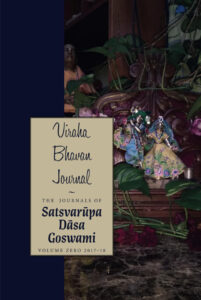
Viraha Bhavan Journal (2017–2018) was written by Satsvarūpa Mahārāja following a brief hiatus in writing activity, and was originally intended to be volume 1 in a series of published journals. However, following its completion and publication, Mahārāja again stopped writing books, subsequently focusing only on what became his current online journal, which began in August of 2018.

At first, I took it hard that I would have to live surrounded by the firemen, and without my own solitude. After all, for decades I had lived in my own house with my own books and my own friends. I was also now a crippled person who couldn’t walk, living among men who did active duties. But when Baladeva explained it to me, how it was not so bad living continually with other firemen and living in the firehouse with its limited facilities, I came to partially accept it and to accept the other men. I came to accept my new situation. I would live continually in the firehouse and mostly not go outside. I would not lead such a solitary life but associate with the other firemen.
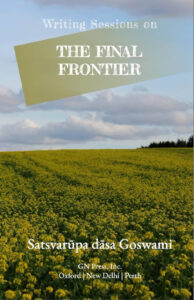
Let me write sweet prose.
Let me write not for my own benefit
but for the pleasure of Their Lordships.
Let me please Kṛṣṇa,
that’s my only wish.
May Kṛṣṇa be pleased with me,
that’s my only hope and desire.
May Kṛṣṇa give me His blessings:
Kṛṣṇa Kṛṣṇa Kṛṣṇa Kṛṣṇa Kṛṣṇa he
Rāma Rāghava Rāma Rāghava
Rāma Rāghava rakṣa mām.
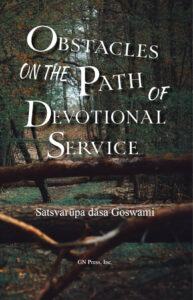
You mentioned that your pathway has become filled with stumbling blocks, but there are no stumbling blocks. I can kick out all those stumbling blocks immediately, provided you accept my guidance. With one stroke of my kick, I can kick out all stumbling blocks. —Letter by Śrīla Prabhupāda, December 9, 1972.
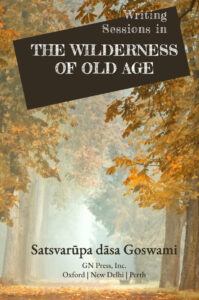
The Writing Sessions are my heart and soul. I’m trying my best to keep up with them. I am working with a few devotees, and they are far ahead of me. I wander in the wilderness of old age. I make my Writing Sessions as best I can. Every day I try to come up with a new subject. Today I am thinking of my parents. But I don’t think of them deeply. They are long gone from my life. Śrīla Prabhupāda wrote a poem when he was a sannyāsī, and he said now all my friends and relatives are gone. They are just a list of names now. I am like that too. I am a sannyāsī with a few friends. I love the books of Śrīla Prabhupāda. I try to keep up with them. I read as much as I can and then listen to his bhajanas.
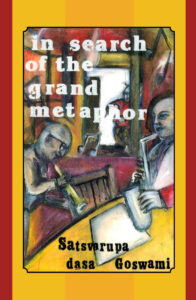
The metaphor is song. Explain it. Yes, particulars may not seem interesting or profound to readers who want structured books.
Wait a minute. Don’t pander to readers or concepts of Art. But Kṛṣṇa conscious criteria are important and must be followed. So, if your little splayed-out life-thoughts are all Kṛṣṇa conscious, then it’s no problem.
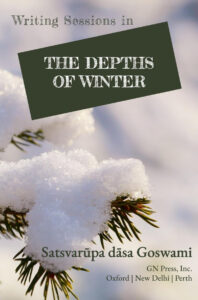
I am near the end of my days. But I do like the company of like-minded souls, especially those who are Kṛṣṇa conscious. Yes! I am prone to Kṛṣṇa consciousness. I have been a disciple of Bhaktivedanta Swami Prabhupāda for maybe almost sixty years. Sometimes I fail him. But I always bounce back and fall at his feet. It is a terrible thing that I sometimes do not have the highest love for him. It is a terrible thing. Actually, however, I never fall away from him. He always comes and catches me and brings me back to his loving arms.

This edition of Satsvarūpa dāsa Goswami’s 1996 timed book, Upstate: Room to Write, is published as part of a legacy project to restore Satsvarūpa Mahārāja’s writings to ‘in print’ status and make them globally available for current and future readers.
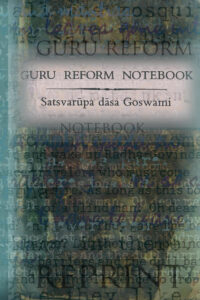
A factual record of the reform and change in ISKCON guru system of mid ’80s.

Readers will find, in the Appendix of this book, scans of a cover letter written by Satsvarūpa Mahārāja to the GN Press typist at the time, along with some of the original handwritten pages of June Bug. Together, these help to illustrate the process used by Mahārāja when writing his books during this period. These were timed books, in the sense that a distinct time period was allotted for the writing, during SDG’s travels as a visiting sannyāsī
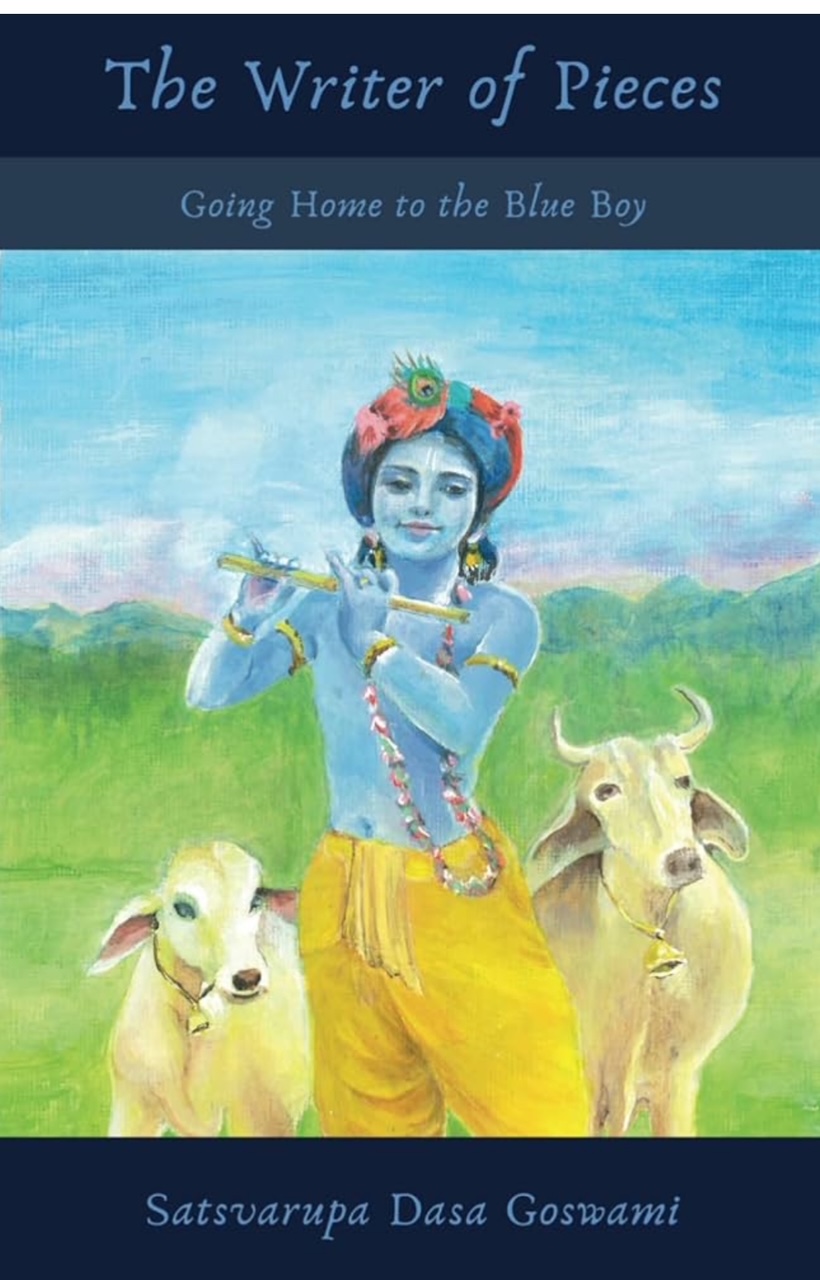
Don’t take my pieces away from me. I need them dearly. My pieces are my prayers to Kṛṣṇa. He wants me to have them, this is my way to love Him. Never take my pieces away.
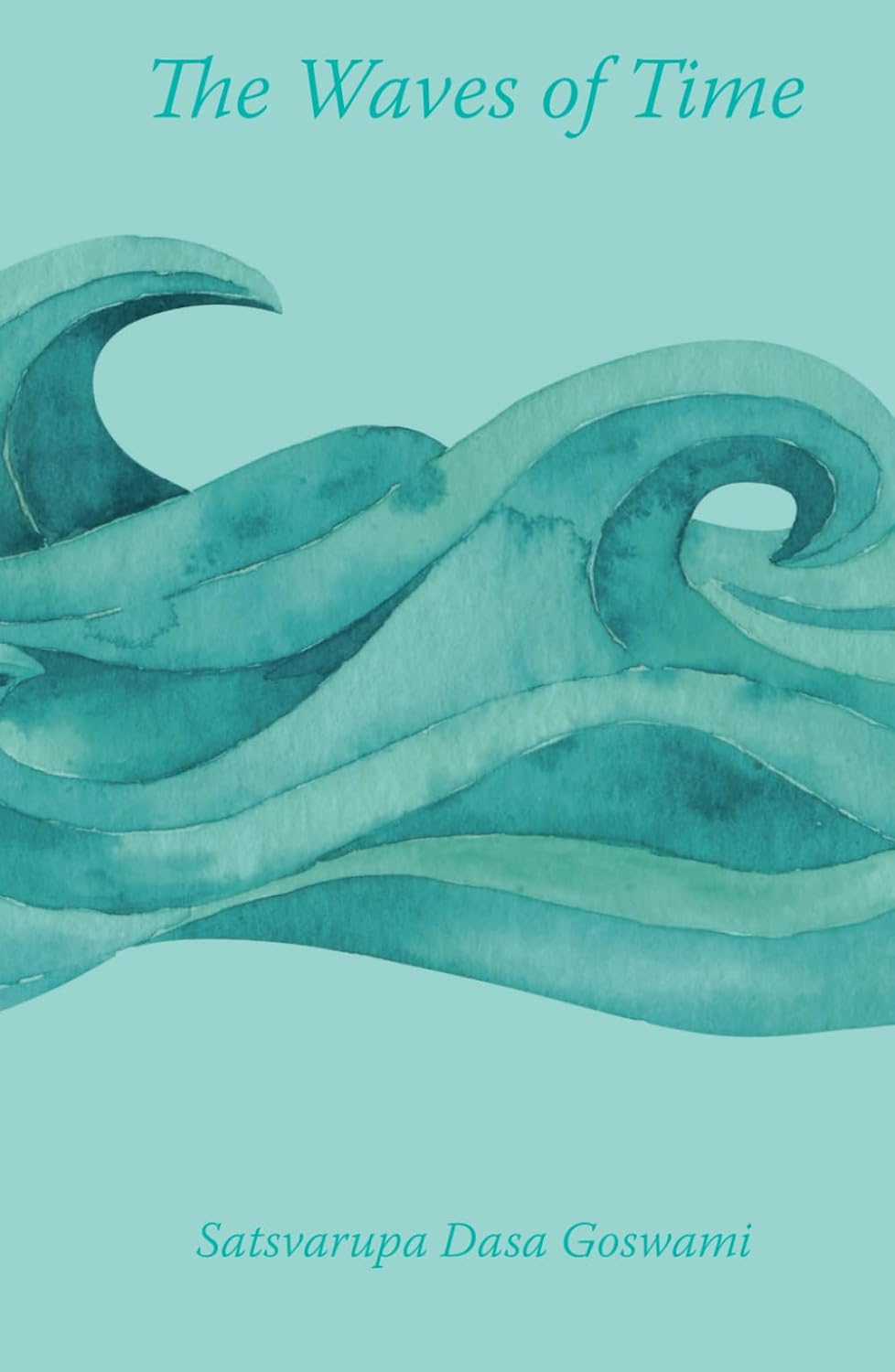
Many planks and sticks, unable to stay together, are carried away by the force of a river’s waves. Similarly, although we are intimately related with friends and family members, we are unable to stay together because of our varied past deeds and the waves of time.

To Śrīla Prabhupāda, who encouraged his devotees (including me) To write articles and books about Kṛṣṇa Consciousness.
I wrote him personally and asked if it was alright for his disciples to write books, Since he, our spiritual master, was already doing that. He wrote back and said that it was certainly alright For us to produce books.

I have a personal story to tell. It is a about a time (January–July 1974) I spent as a personal servant and secretary of my spiritual master, His Divine Grace A.C. Bhaktivedanta Swami Prabhupäda, founder-äcärya of the International Society for Krishna Consciousness. Although I have written extensively about Çréla Prabhupäda, I’ve hesitated to give this account, for fear it would expose me as a poor disciple. But now I’m going ahead, confident that the truth will purify both my readers and myself.

First published by The Gītā-nāgarī Press/GN Press in serialized form in the magazine Among Friends between 1996 and 2001, Best Use of a Bad Bargain is collected here for the first time in this new edition. This volume also contains essays written by Satsvarūpa dāsa Goswami for the occasional periodical, Hope This Meets You in Good Health, between 1994 and 2002, published by the ISKCON Health and Welfare Ministry.

This book has two purposes: to arouse our transcendental feelings of separation from a great personality, Śrīla Prabhupāda, and to encourage all sincere seekers of the Absolute Truth to go forward like an army under the banner of His Divine Grace A.C. Bhaktivedanta Swami Prabhupāda and the Kṛṣṇa consciousness movement.

A single volume collection of the Nimai novels.

Śrīla Prabhupāda was in the disciplic succession from the Brahmā-Mādhva-Gauḍīya sampradāya, the Vaiṣṇavas who advocate pure devotion to God and who understand Kṛṣṇa as the Supreme Personality of Godhead. He always described himself as simply a messenger who carried the paramparā teachings of his spiritual master and Lord Kṛṣṇa.

Dear Srila Prabhupada,
Please accept this or it’s worse than useless.
You have given me spiritual life
and so my time is yours.
You want me to be happy in Krishna consciousness
You want me to spread Krishna consciousness,

This collection of Satsvarūpa dāsa Goswami’s writings is comprised of essays that were originally published in Back to Godhead magazine between 1966 and 1978, and compiled in 1979 by Gita Nagari Press as the volume A Handbook for Kṛṣṇa Consciousness.

This second volume of Satsvarūpa dāsa Goswami’s Back to Godhead essays encompasses the last 11 years of his 20-year tenure as Editor-in-Chief of Back to Godhead magazine. The essays in this book consist mostly of SDG’s ‘Notes from the Editor’ column, which was typically featured towards the end of each issue starting in 1978 and running until Mahārāja retired from his duties as editor in 1989.

This collection of Satsvarupa dasa Goswami’s writings is comprised of essays that were originally published in Back to Godhead magazine between 1991 and 2002, picking up where Volume 2 leaves off. The volume is supplemented by essays about devotional service from issues of Satsvarupa dasa Goswami’s magazine, Among Friends, published in the 1990s.

“This is a different kind of book, written in my old age, observing Kṛṣṇa consciousness and assessing myself. I believe it fits under the category of ‘Literature in pursuance of the Vedic version.’ It is autobiography, from a Western-raised man, who has been transformed into a devotee of Kṛṣṇa by Śrīla Prabhupāda.”
 The Best I Could Do
The Best I Could DoI want to study this evolution of my art, my writing. I want to see what changed from the book In Search of the Grand Metaphor to the next book, The Last Days of the Year.
 a Hare Krishna Man
a Hare Krishna ManIt’s world enlightenment day
And devotees are giving out books
By milk of kindness, read one page
And your life can become perfect.
 Calling Out to Srila Prabhupada: Poems and Prayers
Calling Out to Srila Prabhupada: Poems and PrayersO Prabhupāda, whose purports are wonderfully clear, having been gathered from what was taught by the previous ācāryas and made all new; O Prabhupāda, who is always sober to expose the material illusion and blissful in knowledge of Kṛṣṇa, may we carefully read your Bhaktivedanta purports.

I use free-writing in my devotional service as part of my sādhana. It is a way for me to enter those realms of myself where only honesty matters; free-writing enables me to reach deeper levels of realization by my repeated attempt to “tell the truth quickly.” Free-writing takes me past polished prose. It takes me past literary effect. It takes me past the need to present something and allows me to just get down and say it. From the viewpoint of a writer, this dropping of all pretense is desirable.
 Geaglum Free Write
Geaglum Free WriteThis edition of Satsvarūpa dāsa Goswami’s 1996 timed book, Geaglum Free Write Diary, is published as part of a legacy project to restore Satsvarūpa Mahārāja’s writings to ‘in print’ status and make them globally available for current and future readers.